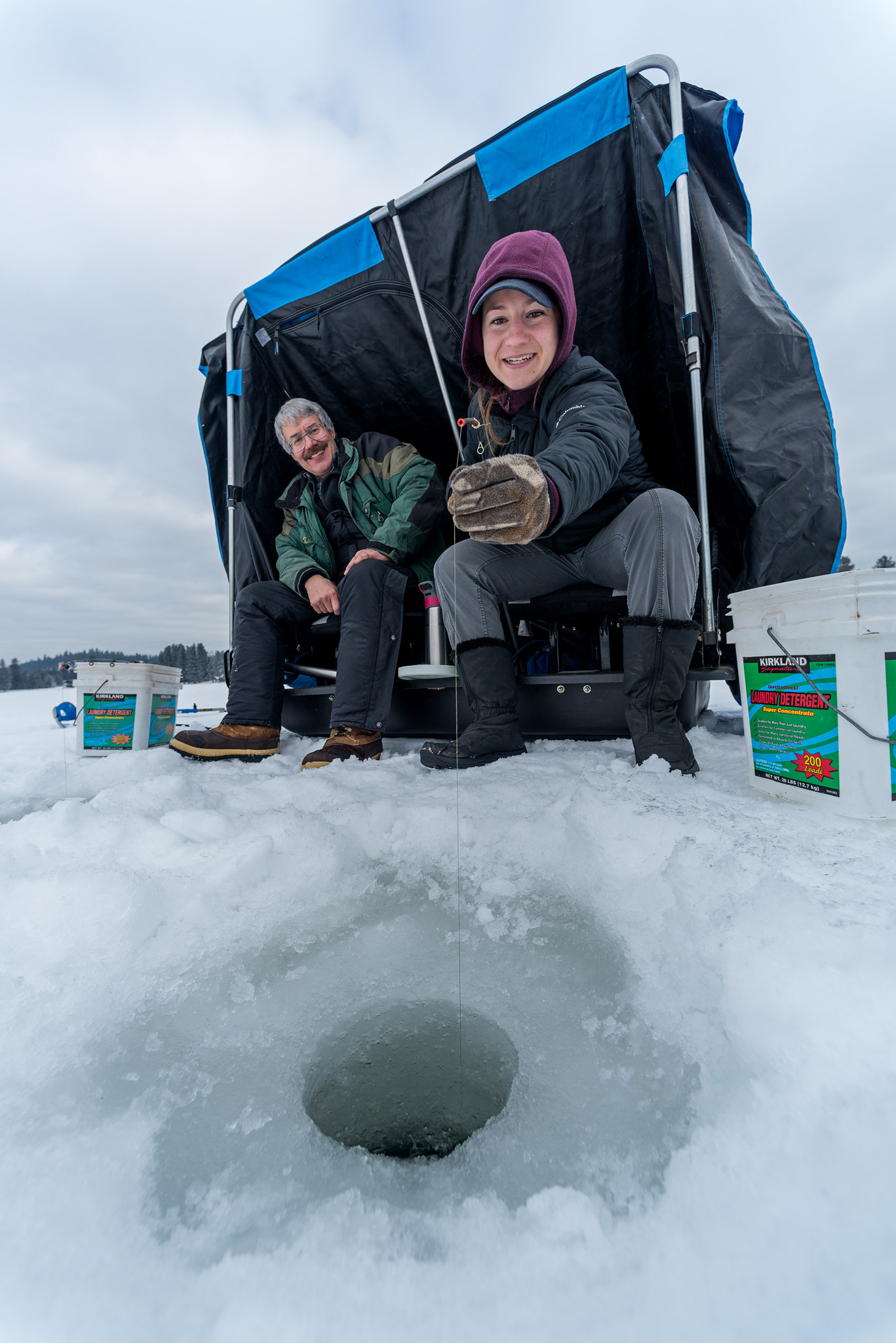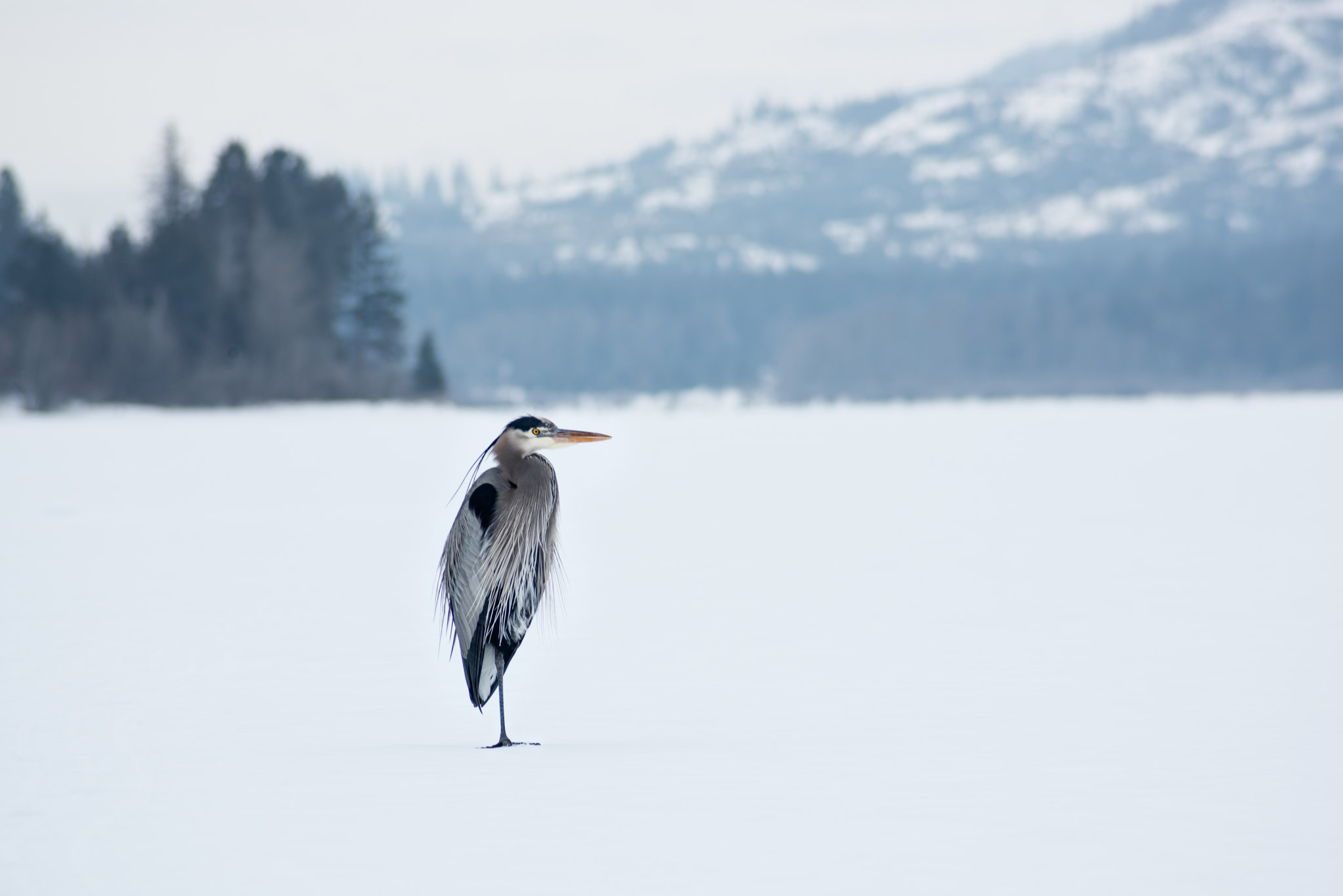Ice fishing. I can’t be the only one who imagines this activity as little more than hunching over a hole in the ice for hours, chilled to the bone, stubbornly — and perhaps a little insanely — challenging the winter elements to see if you can survive long enough to catch a half-frozen fish. Sounds more like a creative form of purgatory than seasonal enjoyment.
Aside from seeming mind-numbingly boring, the thought of being out in the middle of a frozen lake for hours gives me a bit of anxiety. I feel it’s only natural to want to know that the ground beneath you won’t randomly give way. I’ve been learning lately, however, that it’s easy to fear what you don’t understand.With this in mind, I found myself driving out to Cocolalla Lake, just outside Sandpoint, Idaho, to meet up with a friend of a friend willing to enlighten me about this winter activity. It was a crisp late winter morning, the clouds thick and grey as I drove to a gas station to meet up with Steve. I followed him through a little neighborhood to an access point on the north end of Cocolalla Lake.
Upon exiting the warmth of the car, the crystalline breath of winter enveloped my body with an icy greeting. Steve began unloading his gear into some kind of sled, and I stole a glance toward the 800-acre lake. The path out from the parking lot lost itself in the all-consuming whiteness that commanded the expanse beyond us, stretching out toward distant tree-lined shores. Fog streaked the crowns of surrounding mountains, completing the overall feel of a slow, sleepy morning. I spotted the dark specks of a half dozen fishermen spread out against the white, and felt a brief flash of nerves. There was a lot of open lake out there.

Steve finished loading his sled and led the way. He knows what he’s doing, I told myself. He was in no more of a hurry to fall prey to a slushy, eternal slumber than I was. I had to force my mind to trust his expertise; my feet, however, were already following him without hesitation. There couldn’t be that many people out on the ice if it were too dangerous.
I took my first steps onto a frozen body of water, each step more intrigued and confident than the last. I stayed in Steve’s wake as he kept mostly to the trail of footprints forged before us, stabbing the ground with a ski pole as he went. The snow crunched intrusively under my feet amidst the yawning silence, and I eyed the untouched whiteness alongside us with suspicion. I started to rehearse in my mind how if the ice began to break, I’d try to fall backwards to help distribute my weight.
Deciding we were in a good place to start, Steve began setting up our little station. He carved a few holes with a hand auger, a helical, screw-like tool that brings up the snow and ice as it cuts downward. Once he got through to the water, he handed me an ice scoop, which resembled a large slotted spoon, to scoop out the residual ice floating in the water.
Steve explained that there are two different types of ice to be aware of when ice fishing: gray and blue ice. Gray ice is essentially frozen slush, formed when snow melts and then freezes solid. Due to this process, there are air bubbles trapped in it, making it not as reliable for sustaining weight. Blue ice, on the other hand, is formed when the lake itself freezes. As it freezes, the ice on the surface sinks and the water that leaks on top of it then freezes, creating layers upon layers of dense ice. Steve said six to 10 inches of blue ice is ideal, though he could trust anything more than three inches.

After setting up two rods over the holes and converting Steve’s sled into a three-sided shelter, we got comfortable on the seats and manned our stations. I noticed the rods for ice fishing are much shorter than the average bait fishing rod, and there are springs at the tip that the line runs through. Steve explained this is because fi sh bite much more gently in the winter, so a more sensitive mechanism is needed to pick up on their nibbling. Instead of relying on the fish to be aggressive enough to bend or jerk the rod, ice fishers have to watch for the flexing movement of these springs.
I kept an eye on my rod as Steve and I chatted about some of the draws of the sport. He said that for himself and many ice fishers, ice fishing is alluring because it enables them to fish throughout the year and to enjoy the outdoors during the winter months. The season depends on each year’s specific weather, but typically begins around the end of December and finishes sometime in March. I laughed incredulously when he said there are some places, like Minnesota, where the ice is so thick and there are so many ice fishers they have to plow roads on the lakes.
From our wind-protected perch, my curious gaze ventured out and fixated on a great blue heron stationed near some fishers. Though it was pretty far off, I could tell it was a tall bird. Its movements were conservative yet calculated, its attention riveted on the holes, willing the humans to catch something and share the spoils. Steve said they sound like pterodactyls, and my attention was then split between supervising my rod and hoping the heron would shatter this frozen reverie with one of its prehistoric cries.
Story continues after a quick message from our sponsor below.
Some fishermen passed us on their way off the lake and said they’d been catching perch if we wanted to try their holes. I was impressed by this independent camaraderie among ice fishers; a sentiment I felt to be largely universal among outdoor appreciators. Since our spot had been so far uneventful, Steve set out to investigate with rod in hand while I monitored our little camp. The heron moved away from the holes as he approached, but determinedly remained nearby.
After maybe five minutes, Steve started trudging back, appearing to have left his pole behind. I couldn’t tell if he’d caught anything from such a distance. When he was about halfway back, I realized he was gesturing for me to join him at the new holes. Standing to relocate, I suddenly noticed movement out beyond him. The heron had sauntered to where Steve had been, jabbed at something in the snow and took off flying. The pieces all came together in my mind. I realized that Steve had, in fact, caught a fish, and the heron was trying to fly off with said fish, which was unfortunately still hooked on Steve’s rod. Stunned, I shouted something frantic to Steve, then burst into laughter. Steve ran yelling after the heron, which seemed confused by the rod attached to its filched meal and dangling beneath its feet.

Rod in hand and my breath short from laughing, I moved as quickly as I could across the snow toward the crime scene. The heron finally dropped the fish and rod.
This time, Steve left me standing guard over the holes and fish while he went back for the rest of his gear.
As I waited for Steve to return, I reflected on how quickly such serenity could be shattered by an unexpected interruption. My thoughts on ice fishing that had been developing up to that point had taken an interesting turn. The mountains maintained their frigid stillness, the air its icy vitality and the lake its undulating whiteness. But no matter the season, nature is always prone to unpredictability. The tranquil permanence on the lake, felt just moments before, had been fractured by the heron’s daring act and replaced with a sense of hanging anticipation. The atmospheric silence now suggested not that all would remain asleep, but rather that the world was holding its misty breath, waiting for someone or something to break the law of muted movement and boldly express their vitality.
What a remarkable experience. The late morning sun lazily pushed through the clouds, casting a gentle glow upon the frosty world as the warming air invigorated my body. Whereas the cold had initially felt grippingly uncomfortable, I was now able to welcome it as a refreshing change from the stagnation of indoors.
I basked in this new comfort and peace, and reflected on how taken aback I was by this different kind of seasonal interaction and wildlife. Steve and I both ended up catching two yellow perch, giving me the satisfaction of what I considered a successful fishing trip. But this venture ended up being so much more than just catching fish. Although I can’t say I’ve been converted into an avid ice fisher, I felt the gratefulness of understanding as I stood out on Cocolalla that morning, and was able to identify with ice fishers’ desire to be outside and engaged with nature.
The lake’s quiet energy spoke to me and opened my eyes to the persistent wildness of a world that never truly sleeps. N
By Abby Owens
Photography By Joel Riner
As Featured In: Winter/Spring 2020




1 Comment
Interesting and well written.
Thanks for opening my eyes to something I appreciate but will never
experience!